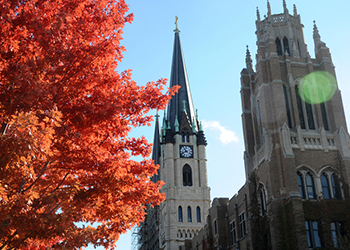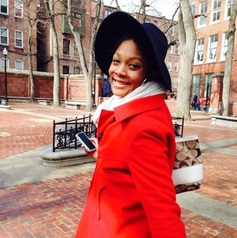 Mentor for UW-Extension's WI 4-H Tech Wizards Youth Development Program and Group Leader for COA Youth & Family Centers
Mentor for UW-Extension's WI 4-H Tech Wizards Youth Development Program and Group Leader for COA Youth & Family Centers
Dyon Bryant is a recent graduate of Marquette University’s English Department. In Fall 2011 Dyon’s research paper “Marquette University: See, Then Be The Difference” was published in Marquette University's ePublications. In her paper, Bryant focused on social justice issues and misconceptions about safety and race on campus. Bryant further explores the lack of commitment to continuing the conversation about these misconceptions related to race and safety at Marquette University. Bryant currently works as a mentor for UW-Extension’s WI 4-H Tech Wizards Youth Development Program and as a group leader for COA Youth & Family Centers. She is passionate about social justice, working in non-profit sectors, and hopes to one day own and run a publication.
What did you learn that you previously were unaware of while researching and writing "See, Then Be The Difference"? Did this research paper help you along your search for a vocation?
"See, Then Be The Difference" taught me how much the "Marquette Bubble" permeates throughout various facets of the campus culture. Also, how a dialogue about our own attitudes toward those of our own or different ethnic or racial backgrounds is perpetuated by society and social constructs of race. This paper helped me further recognize my passion for social justice and racial and ethnic equity and equality, and that passion extends way past my vocational endeavors, but is hopefully bolstered by them.
How does Cura Personalis fit into your career?
Caring for people is not something that only fits in for your career, but something to live by and aspire to do each and every day. My jobs require me to help nurture the individual within—to help nurture and develop vocational, personal, academic, and character skills to help individuals reach their fullest potential.
Can you explain more about your love for non-profit work? What about non-profit work are you attracted to?
My love for non-profits stems from wanting to help diminish racial and ethnic disparities in educational and vocational attainment for future generations. The demographics that we serve through my non-profit jobs are statistically at a disadvantage, and a lot of the factors are beyond the youth's control (e.g., environment, family, socio-economic status). If I can help a youth aspire and recognize that he or she can be more with the proper mentoring and tools, then I've won.
What would you like undergraduate students to know about life after college?
Don't be afraid to defer student loans because it doesn't make you seem irresponsible or lazy—you just have to take the proper financial steps for you.
You had mentioned in class that you would like to one day own and run your own publication. Do you know what exactly you would write about?
As of right now, because my interests range from short stories to non-profit work, to fashion, to home decor, who knows? My publication may consist of all of those topics and then some when I discover another facet of myself in the meantime.
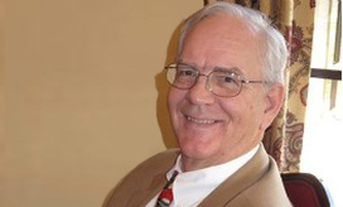 Jude Werra, Jude M. Werra & Associates, LLC
Jude Werra, Jude M. Werra & Associates, LLC
Jude Werra began a lifelong commitment to career management and consulting as a young volunteer with Youthpower in 1964. A Marquette alumnus, Werra graduated in 1965 with a major in Psychology and minor in English. After working for companies such as Manpower Inc., Marshall Field & Co., Badger Meter, Inc., American Motors Corporation, and in the executive search field, he founded Jude M. Werra & Associates, LLC, in 1984, “offering retained executive search, and outplacement and other HR related consulting services.” Werra helps individuals and corporations develop and reach discernment throughout all stages of development. His firm has been named as one of the 100 Leading Management Consulting Firms in North America. Werra publishes an advice blog named CLARITY and compiles the semi-annual Liars Index®.
What is CLARITY?
For the past thirty years, Werra has written essays and advice columns that combine his life experience, knowledge, and care for others in pdf format that has been transformed into a blog titled CLARITY. There, Jude continues to cover a range of topics such as career consulting, risk management, and exploration of the talents and abilities of others and oneself.
What is the Liars Index® ?
Publications such as the New York Times have used Werra’s Liars Index® to uncover false claims of educational backgrounds composed by top leaders and executives. The Liars Index® allows perspective into the common and continued issue of plagiarism and false credentials in resumes from our top executives and leaders.
How did your English education at Marquette University influence your professional writing today?
On reflection, my heavy reading of literature, both didactic and fictional, has had the most influential impact upon my writing. The more one reads, the more that internal author's voice is developed. Anyone who expects to be a good writer needs to be a lifelong reader and learner. An author’s language is born in reading and listening, even in theatre. A good writer need not plagiarize in order to be effective, but the voices of the writers whose work we read will model for us how we ought to write.
What would you like undergraduate students to know?
Be a joiner. Be a volunteer. Be a leader. Be a giver, and be generous with your time, talent, and treasure. There is a club for everything. Participation as a giver will lead to demand for your help, and then when you need help, friends and colleagues will help you in return. You can never have enough friends, but you must never exploit them. They will volunteer to help you if you approach them with a collegial handshake rather than with your palm up.
How did the Liars Index® evolve?
When clients would come to me stunned by a seemingly attractive candidate falsifying an education credential, they often would ask me: "Do you ever see folks lying about their educational backgrounds, and how often does it happen?” I decided to start keeping statistics on the academic credentials of folks who submit their resumes to me, just so I could offer them perspective. After a while I would get calls from reporters researching for a story that they were pursuing for an expose, also asking me how often it happened. Because of the recurring questions, I started calculating the percentage semi-annually and releasing the statistics. Calls from press continue, especially when an executive with a major corporation is caught with a false credential. Radio, TV, magazine, and newspaper publishers, as well as bloggers and book authors, all have found it a frequent topic.
What is your favorite thing about your career in management consulting?
When I am able to help people address important problems, there is a satisfying reward in our collaboration. Every day brings important challenges. If you serve people well, business turns to you, friends refer friends. A successful executive told me decades ago: "Always be worth more than you are making, and you will never be out of work.”
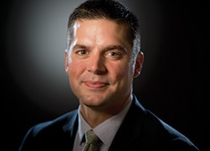 Timothy Posnanski, Attorney, Whyte Hirschboeck Dudek, S.C.
Timothy Posnanski, Attorney, Whyte Hirschboeck Dudek, S.C.
Originally from St. Louis, Missouri, Timothy Posnanski quickly garnered an affinity for Milwaukee during his undergraduate career at Marquette University, where he graduated cum laude with a B.A. in English and Philosophy in 2002. Upon graduating from law school in 2005, Posnanski began a career with Whyte Hirschboeck Dudek, a business law firm that was recognized in 2014 by U.S. News as one of the nation’s “Best Law Firms.” He was elected as a shareholder in 2013 and promoted as Co-Practice Group Leader of the Litigation Practice Group at Whyte Hirschboeck Dudek. In 2013, Posnanski was named as one of Wisconsin’s Up and Coming Lawyers by Wisconsin Law Journal, and a “Rising Star” on the Wisconsin Super Lawyers list. Posnanski is an active leader in Milwaukee's community, holding positions within the Board of Directors for the Hope House of Milwaukee, Inc. and Board of Directors for the Milwaukee Tennis & Educational Foundation. His other interests include creative writing, politics, history, and Marquette basketball.
How does writing continue to play a role in your life personally and professionally?
Unfortunately, writing does not play as much of a role in my personal life as I would prefer. Having two small children at home certainly doesn’t help in that regard. Professionally, writing is central to my job. With the exception of in-person meetings with clients or oral arguments to the court, my entire job is based upon writing. Specifically, much of my job depends upon convincing the court, opposing counsel, or a mediator of the merits of my clients’ positions. Of course, all pleadings are written. Many cases resolve before trial and often resolve based upon dispositive motions or arguments persuasively setting forth your client’s position.
What would you like undergraduate students to know about life after college?
Your reputation is incredibly important. It is very easy to alter someone’s perception of you (i.e., potential employers, professional colleagues) through a careless post or tweet that is publicly disseminated. After you graduate, your reputation will open doors or close them. It’s difficult and takes many years to develop your reputation through hard work and dedication. It’s very easy to ruin it. Your conduct, whether online or in person, always makes an impression.
While attending Marquette University, how did you begin to translate your English major into a career?
I made sure I took classes I believed would translate well into law school. Accordingly, I took classes that required me to read and write, usually by interpreting what I had read and supporting my interpretation based upon the text.
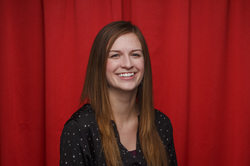 Lydia Eichner, Senior Content Specialist, Laughlin Constable
Lydia Eichner, Senior Content Specialist, Laughlin Constable
Lydia is the senior content specialist at Laughlin Constable, a full-service advertising agency with offices in Milwaukee, Chicago, New York, and New Jersey. Lydia graduated from Marquette University in 2011 with a B.A. in Writing-Intensive English and Women’s and Gender Studies. In her free time, Lydia is an active volunteer for the Milwaukee LGBT Community Center and formerly worked with Creative Alliance Milwaukee. In her work, she writes blog content and manages the conversations it creates.
What is something you think undergraduates should know about writing in the professions?
Humility is important. Your writing will likely go through several rounds of edits before being pushed out, and even if you think it's perfect, someone will come in and remove your Oxford commas, change what you thought was clever phrasing, etc. Plus, in most cases, your name won't be attached to anything you do.
Where have you seen connections between your studies and coursework and your job today?
Writing push notifications for mobile apps often reminds me of poetry. We often have to create very concise, punchy content with significant character restrictions, which requires a lot of creativity and "slash-and-burn" editing. Every time I write a blog, it's basically writing a paper—the connections are everywhere.
How does non-profit work differ from agency work?
Non-profit work requires you to wear many hats while finding creative ways to stretch limited resources. It's a great exercise in self-sufficiency and also allows you to meet lots of people from various industries. Agency work means slightly fewer hats and many more resources. Both types of work require passion for the work you're doing. At least for me, in both roles, there's no clocking out.
How do you use the skills you gained as an English major outside of your work?
Besides continuing to write for fun, I use the skills I've gained every day—it's a way of thinking critically and analyzing the messaging, perspectives, and frameworks around us. It's a way of seeing the world.
What moments were most crucial in shaping the work you do today?
Having the opportunity while at Creative Alliance to work with a number of talented, driven people. It's so important to surround yourself with people who inspire you and push you to be better, and I couldn't have been surrounded by a better team. I also have the Women's and Gender Studies Department and Honor Program to thank—two crucial aspects of my education at MU that opened my eyes and ignited my passions.
What parts of your work do you find most rewarding?
It's so rewarding to be able to connect women with the information they need to make informed decisions about their health. In other words, when I do community management for social media channels and someone asks a question, I love having exactly what they need on hand. Being a part of the overarching strategy where I'm helping determine what content is necessary to create, and then seeing that content fill a specific need that our audience has—it's so satisfying to see it all fit together.
How do you find your own voice while writing for someone else?
I'm sort of surrendering my voice to the voice of the brand, so in my head, it's almost as if I'm playing a character. We have general guidelines for voice/word choice/style that we must follow, but there are times when I try to spice things up and get a bit more creative. The worst thing that could happen is the client rejects something, and even if they do, it's still good to show some playfulness and range.
What challenges must you overcome to be effective with your work?
Staying self-motivated and working without a lot of direction, at times. It can be challenging to juggle multiple deadlines and have to constantly re-prioritize/shift things around, but it keeps me on my toes.
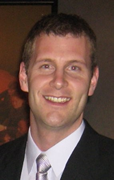 Dan Bergen, Ph.D., Planning Director for the Office of Community Engagement, Marquette University
Dan Bergen, Ph.D., Planning Director for the Office of Community Engagement, Marquette University
Dan Bergen, Ph.D., serves as the planning director for the new Office of Community Engagement at Marquette University. Dan received his Ph.D. in British Literature from Marquette University, where his research focused on cognitive theory and empathy development through literary engagement. He received his B.A. in Advertising from UW-Eau Claire, and his M.A. in Cultural Studies from Kansas State University. Before his current role, Dan served as the interim assistant vice president of Student Affairs, where he oversaw sexual violence prevention education and advocacy, divisional communications, and neighborhood relations. In his free time, he enjoys exploring the great works of Mo Willems and Ian Falconer with his two-year-old son and eight-month-old daughter.
What made you choose Marquette to earn your Ph.D.?
I chose Marquette University for two reasons: mission and academic rigor. I had the opportunity to work at Marquette University prior to entering the doctoral program in English. As an employee, I came to value Marquette University’s mission and the ways in which it is intentionally integrated into the lived experience of the institution. The Catholic, Jesuit values of social justice and the formation of mind and heart were particularly meaningful to me as I deepened my intellectual capacity, and explored what it might mean to be an engaged teacher, researcher, and scholar.
The academic rigor of the English program was the second reason I was drawn to Marquette University. The faculty represent a broad and deep base of knowledge, and many of them are internationally recognized scholars in their respective fields.
How would you describe your experience in the English department at Marquette?
Collegial. The environment is challenging, but supportive. It was always clear to me that, while their approaches to teaching varied widely, every faculty member utilized the classroom to prepare their future colleagues.
How has Marquette's English program prepared you for your current career?
In my current role, I oversee Marquette’s Office of Community Engagement. The position demands a deep understanding of key community issues, and a broader awareness of the institutional resources available to address those issues. The Ph.D. program in English provided me with highly transferable tools, methods and applications for the processes of critical inquiry, thematic exploration, and strategic planning. I utilize the skills and techniques I learned in literary and linguistic research to better understand the nature and impact of the issues facing the community. In fact, narrative and storytelling are at the core of all efforts to build and strengthen the communities of which we are a part.
What advice would you give current students majoring in English at Marquette?
Write. Get involved with local literacy programs. Write. Volunteer your writing skills for local non-profits, or businesses. Write. Use this time to develop your unique writerly voice. Write. Submit opinion pieces to local and online forums. Write. The use of language, writing, and rhetoric may shift, but it will not go away—cultivate your talent in communicating through writing and you will be an attractive candidate in any field.
What advice would you give future students majoring in English at Marquette?
Build relationships with faculty members. They are smart and dedicated scholars, teachers, and mentors. Seek to understand their research and passions. You will learn a lot about literature, writing, rhetoric, and theory, but you will learn the most about the field of English and what it takes to be a professional academic by observing how the faculty engage in their many crafts of teaching, research, scholarship, and service.
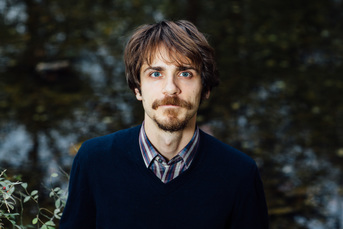 Joe Scapellato, Assistant Professor of English, Bucknell University
Joe Scapellato, Assistant Professor of English, Bucknell University
Joe Scapellato is an Assistant Professor of English at Bucknell University, where he teaches courses in creative writing and contemporary American literature. He earned his BA in English at Marquette and his MFA from New Mexico State University. His short story collection Big Lonesome(Houghton Mifflin Harcourt) was be published in the spring of 2017 and his novel The Made-Up Man (Houghton Mifflin Harcourt) will be published in the spring of 2018. Below, he discusses his works and how his time at Marquette helped him with his writing career.
How would you describe your collection Big Lonesome?
I tried to make it so that the stories in Big Lonesome, when considered together, go on a journey. They begin in a mythic west (a centaur cowboy, a cowboy who encounters a filthy monster-boy in a laundromat, a cowboy who can sing animals into easy dying), move to a contemporary west (a mother who buries her son’s gun in a desert, a hike that results in a snakebite), and migrate to the contemporary Midwest (two troubled brothers in Chicago, an old man forced into a retirement home by his son).
Along the way, the stories shift from the non-realistic to the realistic and from the rural to the urban. And certain ideas (American mythology, masculinity, lonesomeness) are returned to and riffed on in different ways.
Kevin McIlvoy, a wildly gifted writer and teacher, once told me that he thought of story collections as being somewhere on a greatest hits album/concept album continuum. On the “greatest hits album” side are the collections that are made up of the writer’s very best stories at that moment in the writer’s life. There’s going to be thematic resonation between these stories—they’re going to speak to one another—but this isn’t necessarily the most important guiding principle when the writer is putting together the collection.
On the “concept album” side are the collections where thematic resonation is the most important guiding principle—the stories very consciously complement and complicate one another. They seem to have grown out of each other, like songs in a concept album.
Both kinds of collections can be terrific! The kind I usually like reading more are concept album collections, so that’s what I attempted to make.
What about your novel, The Made-Up Man?
The Made-Up Man is about a man who knowingly puts himself at the center of a menacing performance art project, one that mines his personal life for material in increasingly sinister ways. The man makes this decision partly because he’s being manipulated by the lead artist (his uncle), partly because of a woman who’s just rejected his marriage proposal, and partly because he’s having trouble seeing that he’s being ground down by an identity crisis. It takes place in Chicago and Prague.
My goal is for The Made-Up Man to be a kind of inverted literary film noir—for it to warp the conventions of detective/crime fiction.
What inspired you to write these works?
Big Lonesome began in 2008, when I graduated from New Mexico State University’s MFA program and moved to Central Pennsylvania with my now-wife. As we settled in, I found that every story that I was working on wanted to be set in the southwest. I admitted to myself that I missed New Mexico. I began to feel a preservative urgency, a need to get something of the experiences I’d had in the southwest into my work. I wanted to hang onto what I’d felt when there, the big feelings you get in a big landscape. Cowboys started showing up in my stories. And through the cowboys came myth. Myth is the one thing I’ve loved my whole life. As soon as myth arrived, it became more important than anything else. The stories started to be about more than cowboys—they started to be about American mythology. The myths of the American West. Myths of American masculinity. Myths of American identity.
In 2010, I had the amazing good fortune of having one of these mythic/cowboy stories accepted for publication by David McLendon in his outstanding literary magazine, Unsaid. In an email he suggested that I write a book-length work based on the cowboy character from the piece he’d published. I thought a lot about doing this, but couldn’t make it happen—I felt that this idea was close, but that the book, if there was one, was about other things, too.
Then in 2012, I started a Ph.D. program in Literature and Creative Writing at University of Houston. My goal in that first year was to finish a draft of a project. Any project! I looked at what I had: a terrible dead novel that had resisted multiple terrible resurrection attempts, the beginnings of a hybrid-genre work that would require lots of research, and a dozen mythic western stories, most of which had cowboys in them. I put all of the latter into one document. I decided that I would start thinking about it as a collection.
That year, I directed every course assignment that I could towards the completion of this project. I tried to explore American myth, big feelings, and lonesomeness. And the stories suggested other stories. The project grew past cowboys. That’s when it started feeling like a concept album.
The Made-Up Man began in 2005, when I started my MFA. My very first assignment in my very first workshop class (with Kevin McIlvoy, who I mentioned earlier) was to write 40 pages—the beginning of a novella.
The summer before I moved to New Mexico to start the program, I traveled for a month with my friend Andrew, who had just finished his undergrad at a film school. One of the places we went was Prague. The city captivated me, just as it’s captivated so many others. As me and Andrew walked its crooked alleys, saw its noble sights, and bumped through its drunk, high, and ever-teeming tourist-crowds (of which we were a part), we agreed that it’d be a good place to shoot a film noir.
In New Mexico, I was still thinking about Prague. I decided to use the workshop assignment to 1.) try to set a noir in Prague and 2.) try to find out what captivated me about Prague.
I worked on this novella throughout grad school, picking it up, putting it down. After graduation, I took a peek at it once or twice a year, but couldn’t make it come together. Then, when me and my wife moved to Chicago in 2013, I started it again, this time without looking at the old drafts. My goal was to turn it into a novel. I’ve been working on it since.
How did your writing career begin?
One afternoon when I was a kid, I drew a series of pictures, a one-panel-per-page “comic book.” This was before I knew how to write. I knew that a comic book needed text to be official, captions of some kind, so I drew big blank boxes at the top of every page. Then I asked my endlessly patient mom to write what I dictated in those boxes. She was nice enough to do so. In this “comic book,” Spiderman fights armies of aliens. He steals a mean-looking alien lasergun. He blasts hundreds of aliens into bloody halves.
I remember this only because my mom still has the stapled-together pages of it. A limited print run.
How did Marquette's English department influence your career as a writer?
I wouldn’t be publishing a short story collection this February if it weren’t for Marquette’s English department. I’m indebted to their warmth, intelligence, honesty, and encouragement.
As a writing-intensive English major, I couldn’t take a creative writing class until I was a junior, but when I did, it was with CJ Hribal. He exploded my mind. He led exciting discussions of craft, assigned rigorous exercises, and gave incredibly helpful feedback. He also told me what an MFA program was. I’d had no idea—it was a description of exactly what I’d been looking for. During my senior year, he helped me apply.
I also took two classes with Larry Watson: an advanced fiction class and an independent study on writing the novel. He taught me more than I can possibly put into this interview about discipline, form, and language, about unity and wholeness, and about writing from a place of mystery. One time when I walked into his office for our weekly meeting, he was in the middle of revising his own novel. He asked me to hold on for one second—he saved his novel draft to a jump drive, closed it, and removed the drive. This might sound silly, but I was stunned. In that moment, I saw a novel as a thing that could exist on a computer. It wasn’t just a thing that came out complete on bookstore shelves. It was a thing that you made on your computer, one afternoon at a time.
And if all of that wasn’t enough, CJ and Larry have mentored me every step of the way, after graduation.
Before I took those amazing creative writing classes, however, I took composition and literature classes with Rebecca Nowacek and Amelia Zurcher, two brilliant teacher-scholars who taught me how to read, think, and write—about rhetoric, literature, and life—in ways that have permanently made me a better person. I don’t know where I’d be without them.
It makes me so happy to see that all four of these extraordinary professors are still on the faculty, to know that they’re still turning students into people.
What advice would you give future writers, especially those who are undergraduate students?
It took me longer than it should have to give myself permission to write the kind of work that I wanted to write. I spent a lot of time writing the kind of work that I thought I ought to write.
Give yourself permission to write the kind of work that you want to write!
Write close to what’s interesting to you.
When you’re writing the kind of work that you want to write, when you’re writing close to what’s interesting to you, you might not be able to make it come together right away. It might be missing something. It might be missing several somethings. But if you stay with it, if you don’t give up, if you accept the idea that it might take a while, you can find a way to make it sing.
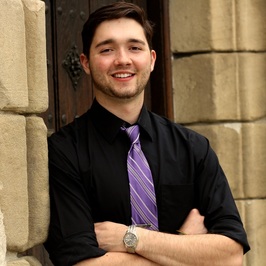 Wyatt Massey, Journalist
Wyatt Massey, Journalist
Wyatt majored in Writing-Intensive English and advertising while at Marquette. During his time at Marquette, Wyatt interned for the university as well as CNN and the Marquette Neighborhood News Service. A big advocate of social justice and health issues, Wyatt also runs his own website dedicated to these issues. Below, Wyatt shares how the English department prepared him for his career in journalism.
What made you decide to become an English major?
My current life has little in common with that of the naïve, 18-year-old version of me who showed up on campus in 2012. The one thing that has stayed consistent, though, is my love of storytelling. I knew coming into Marquette I wanted a career where I could write and be creative, which is why I chose the writing-intensive English path. English was my favorite class in high school because it balanced a sense of emotional expression with finding and making sense of our world.
My initial goal at Marquette was to become an advertising copywriter for nonprofits. However, during my junior year, I came to understand my true calling in journalism. The success I experienced so far, in a few years in the industry, is a direct result of the professors in Marquette’s English Department teaching me ways to write, research and structure narratives.
How would you describe your experience in the English department?
I have my degree, so I can say this without hesitation: I wasted opportunities just writing the paper to get it done. I skipped some readings, too. Sorry. Then, after college, I read those books and wished I could discuss them with a class of like-minded people. Despite my minor regrets, though, I am thankful for the skills, knowledge and laughs the English department provided. My major gave me the space to nerd out about all the things I love. Here’s looking at you, books, coffee shops and a Shakespeare obsession.
How has Marquette's English program prepared you for your current career?
As a journalist, I have three main jobs. First, is to find stories worth telling. There are over 7 billion people on the planet, all doing millions of things each day. My role is to help tell what is important and explain its impact on others. The English courses at Marquette opened my mind to a variety of stories, many of which were different than my own. Researching for classes provided me the confidence to search archives and use digital tools, as well as doing the actual work of going and talking to sources.
Second, I have to determine how to tell stories. My humanities education made me aware of others and taught me the various ways a story can be told to make a difference. Yet, there is a reason “Strange Fruit” is most impactful as a performance, while For Whom the Bell Tolls moves readers with text. On a day-to-day basis, I have to determine which stories will play best in text, video, audio or on the various social media platforms.
Third, my job requires me to tackle large, often ambiguous topics. Writing about poverty or addiction in a way that makes a difference goes beyond regurgitating statistics. Connecting with individuals willing to share their personal stories, talking to researchers and having the patience to mine for relevant data is an ambitious undertaking. Undergraduate writing courses at Marquette gave me the chance to practice crafting personal research projects, which provided vital experience in trying to grapple with big issues. I am grateful for the patience of my professors and the margin of error I had as a student in doing this kind of work. The outside world is not quite as gracious.
What advice would you give current students majoring in English at Marquette?
First, go to office hours. Yeah, I know, how many times have you heard that? But, actually do it. Get over yourself. The professors are awesome. They are experts and have done amazing things to get their teaching position. Be willing to ask them big questions about life, the ones that contain “why” or “how.” Soak up their knowledge because you will never have the same kind of access after graduation.
Second, find a project or topic you love and run with it. Find ways to bring your pursuits into schoolwork. Craft your own projects to get course credit. Do not just do school work for the grade. You will be miserable. Plus, your college work can build connections with life-long friends and increase your job prospects. If you are unsure of what interests you or what you want to do after college, try as many things as possible and see what sticks.
What advice would you give future students majoring in English at Marquette?
Again, go to office hours (see above).
Also, find a mentor. Connect with upperclassmen, professors or alumni. Marquette graduates love to help students. Find someone who shares your passion or career goals, and reach out. I would love to answer questions or help in any way I can. Learning from someone in the thick of life is the best way to see if the career or major is right for you. Reach out. Just go for it. Life moves too fast to waste time wondering.
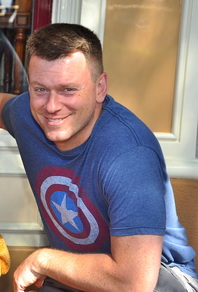 Adam Plantinga, Police Officer, San Francisco Police Department
Adam Plantinga, Police Officer, San Francisco Police Department
A current police officer with the San Francisco Police Department, Marquette alum Adam Plantinga used the training and skills he attained while acquiring his English degree to write his recently published book 400 Things Cops Know.
What inspired you to write 400 Things Cops Know?
Writing has always been my hobby. I don't hunt, fish, or play cards, so I have to do something to stay out of trouble. Also, I wanted to give the reader an insider's look into urban police work. I think that most folks' contact with the police is limited to an occasional traffic ticket or reporting a car burglary. I don't think most people know what police officers do all day, or what the job looks like, or what the job feels like. The book is about those kind of things. In addition to that, I find so many aspects of law enforcement downright fascinating. Like how auto thieves operate, and all the creative places drug dealers hide their stash, and the ways you can tell that someone walking down the street is carrying a concealed firearm. My hope is that the reader will find those things pretty interesting too.
While attending Marquette University, how did you begin to translate your English major into a career?
I didn't become a police officer right out of college. I joined the Jesuit Volunteer Corps (JVC) and spent three years in Houston working at a shelter for homeless teenagers. Then I took on a couple different jobs before becoming a cop in Milwaukee. But no matter what kind of work I've done, the ability to absorb information and turn around and effectively communicate it to others has been a huge help. When you can do that well, you become sought after, no matter what your profession.
How did your English education at Marquette University influence your professional writing today?
I had first-rate teachers. Like Virginia Chappell, CJ Hribal, Thomas Jeffers, and Tim Machan and his powerful mustache, which dominated the classroom. They taught me to write clearly and forcefully and they rightly called me out when I turned in work that was subpar. Also, being a student at Marquette in the heart of the city sparked my interest in urban affairs and got me going on the road to writing about them.
What would you like students to know about life after college?
Strongly consider a year (or more) of service after college, whether it be the JVC, Teach for America, or the Peace Corps. Get out there and see a different part of the country or the world and get a feel for how other people live. You don't have to start running on The Man's treadmill right away. Plenty of time for that later.
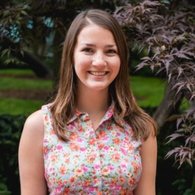 Lisa Bonvissuto, Editorial Assistant, St. Martin’s Press
Lisa Bonvissuto, Editorial Assistant, St. Martin’s Press
For many students looking to major in English at Marquette, the possibilities in store upon graduation can seem exciting and daunting all at the same time. Sometimes, it can be difficult to zone in on exactly what one wants to make out of their English Degree. For Lisa Bonvissuto, editorial assistant of St. Martin’s Press, she decided what she wanted to do after graduating, and used the Marquette University English Program to propel her forward.
Bonvissuto graduated from Marquette in the spring of 2016. She had always loved reading and writing, and she had known for some time that she wanted to be an editor. For her, English was the only major that ever seemed fitting.
“I loved my experience in the English department. I had great professors who went out of their way to both engage with me in class and talk to me on a personal level…I also had a great time getting involved in the English department’s extracurriculars and having the opportunity to organize events,” Bonvissuto recalls. She also looks fondly on how Marquette English classes allowed her to formulate opinions and discuss them in a classroom setting.
The summer after her junior year, Lisa had an internship with a literary agency in New York City, which influenced her decision to move there after graduation. The summer after she graduated in 2016, she attended the Columbia Publishing Course at Columbia University, and she got the opportunity to obtain many contacts from the director of the program. She interviewed for a job at St. Martin’s Press, which she was then offered and started working there in August.
At St. Martin’s Press, she is an assistant to two editors. She says, “I support all of their books and help them with whatever they need, which varies day to day. The biggest part of my job is communicating with authors and connecting them to the other departments at SMP who are working on their book, like production, publicity, and marketing. I answer their questions, make sure everything stays on deadline, and keep them informed on what’s happening.” Lisa also does work writing the description that goes on the book jacket and online, reading and editing submissions, and other various jobs.
Since working at St. Martin’s Press, she notes that Marquette English has been a huge help in preparing her for her position. “The creating writing classes I took played a huge part in preparing me…critiquing others’ work during class and having my own work critiqued has informed how I handle my authors now,” says Lisa. Many of the skills learned in writing and literature courses carry over into the workplace. Things like time management, sharing and critiquing work, and communication skills all are present in this environment.
Lisa Bonvissuto is without a doubt representing the Marquette community well over on the east coast, and we are very proud of her dedication to her education and employers. We cannot wait to see where she goes from here and how she will continue to expand her skill set.
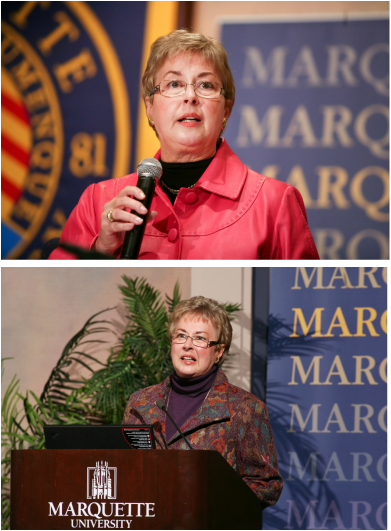 Donna Farrell, Volunteer Reading Tutor
Donna Farrell, Volunteer Reading Tutor
“I could write volumes,” Donna Farrell said, when asked to share her Marquette story as the first alum profiled in our department newsletter. The amazing thing is that she has already given us these volumes. Her generous actions, words, and spirit are the volumes that have been written – she has created inspiration in our Marquette community and has established a legacy with incredible depth. Marquette University strives to instill in its students the ideals of faith, excellence, leadership, and service, so that when they become alumni/ae of this institution, they are prepared to exhibit excellence in these core values throughout their personal and professional lives. This particular alumna from our English Department has done so in extraordinary ways and continues to do so every day. Since graduating in 1970 from the College of Arts & Sciences, Donna Farrell has illustrated what it means to “be the difference” in concrete ways. Her remarkable contributions to her family, her professional life, and to the Marquette University community continue to distinguish her as an esteemed member of the Marquette English community. Still, writing about her incredible accomplishments and continued generosity to Marquette will not do these accomplishments justice, especially given Donna’s unique voice and knack for storytelling. After all, she is one of Marquette’s finest literature gurus. “I chose English as a major because I have always had an intense love of literature,” she said when asked about the reasons for her pursuit of an English major and how this decision has shaped her professional and personal development. “[Studying English] helps you to grow and experience more of life,” she said.
Experiencing life and learning lessons beyond the classroom have certainly been a fundamental element of Donna’s story. After marrying a fellow Marquette student and moving to south Texas, Donna was hired within a week to teach reading to students in the public junior high school. “One of my classes was an English class meant for remedial readers. That was fine with me, but there were no textbooks – remember, this was 1971, before the days of the internet and copy machines. We had one mimeograph machine to use for the school, so I called some friends at Marquette and a former professor, and they sent some books that I had used. I will never forget how much that meant to me.”Donna never let her connection with the Marquette community lapse, despite the challenges that crossed her path. When asked to articulate one of the greatest lessons she learned through these experiences, Donna talked about lessons she learned early in life: “never giving up” and the importance of perseverance. “Don’t quit, no matter how hard the situation might be,” she said, “and, be sincere. Sincerity is such a simple word, and yet it embodies being faithful, trustworthy, and always giving and doing the best you can.”
Teaching in Texas enabled her to put this perseverance and sincerity into action. Without anything close to sufficient funding, she was able to direct and produce the first play the school had ever performed. “With sixth, seventh, and eighth grade students, we put on The Christmas Carol just for the school. I had no money, nada! Marley’s chains were old bicycle chains and his beard was made of cotton balls glued together. But, the best part was watching the students dedicate themselves and really get into the play – they really did a wonderful job.”
She credits her Marquette education as the impetus for her volunteering and making an effort to “impact and really help people.” It has shaped both her personal and professional life and she continues to act on it. “After my husband left the Navy, he took an engineering job in LaCrosse, WI. We knew no one in that area, but because of what we learned at Marquette about the meaning of volunteering, we went to the only Catholic high school in the area and volunteered to host a party for seniors considering Marquette. The following year, the party included potential students and returning students.” This passion for uniting communities and impacting lives through volunteer work is what led her to develop new ways to bolster the 'spirit of ‘the Marquette family' that was, in 1984, already stronger than ever.” Her strongest contributions came through her years of service as the Association of Marquette University Women (AMUW) President. The AMUW is an organization supporting students with scholarships and mentors, where she established the AMUW Women’s Faculty Achievement Award and acted as the National Alumni Board President.
Donna's active participation in the continued enhancement of the Marquette community stems from her relationship with the Marquette faculty. “I have so much respect for the Marquette faculty,” she said. “I had the privilege of co-chairing the Women’s Centennial Celebration at Marquette with Dr. Krista Ratcliffe in 2009. We tried to plan events for both alumni and students, as I have learned that you are always better prepared for your future when you know your past.” Donna continues to serve on the Women’s Council at Marquette, yet another example of her extraordinary ability to “be the difference” to the community.
Even among these incredible contributions to many diverse communities over the years, Donna has never lost what truly motivates her: a love for literature and a love for service to others. “My love of literature has not diminished over the years. Literature is meant to be shared and discussed. We learn from others and it enriches our lives too. Good literature is food for our mind and our soul,” she said. Donna's love of literature is evident in her status as co-chair of the AMUW Book Club and participation in four book clubs, two of which she founded.
Naturally, given her identity as a literature guru, we couldn’t let her avoid a question about her favorite books. Here’s what she shared: “I have many favorite authors and books, but some of my favorites include anything by Zora Neale Hurston, John Irving, Sebastian Barry, and poet Seamus Heaney; Ernest Gaines’ Lesson Before Dying; Geraldine Brooks’ People of the Book; Frankl Man's Search for Meaning; and Alice Munro’s Hateship, Friendship, Loveship, Marriage. Currently I'm reading TRANSATLANTIC by Colum McCann.”
As far as volunteering and working to make an impact on those around her, Donna said she has “always received more than [she has] given to others.” Hopefully, she will continue to write volumes about the work she does and the humility with which she faces every challenge and opportunity she encounters.
Photos courtesy of Dan Johnson, Marquette University Chief Photographer
 Mentor for UW-Extension's WI 4-H Tech Wizards Youth Development Program and Group Leader for COA Youth & Family Centers
Mentor for UW-Extension's WI 4-H Tech Wizards Youth Development Program and Group Leader for COA Youth & Family Centers Jude Werra, Jude M. Werra & Associates, LLC
Jude Werra, Jude M. Werra & Associates, LLC Timothy Posnanski, Attorney, Whyte Hirschboeck Dudek, S.C.
Timothy Posnanski, Attorney, Whyte Hirschboeck Dudek, S.C. Lydia Eichner,
Lydia Eichner, Dan Bergen, Ph.D., Planning Director for the Office of Community Engagement, Marquette University
Dan Bergen, Ph.D., Planning Director for the Office of Community Engagement, Marquette University Joe Scapellato, Assistant Professor of English, Bucknell University
Joe Scapellato, Assistant Professor of English, Bucknell University Wyatt Massey, Journalist
Wyatt Massey, Journalist Adam Plantinga, Police Officer, San Francisco Police Department
Adam Plantinga, Police Officer, San Francisco Police Department Lisa Bonvissuto, Editorial Assistant, St. Martin’s Press
Lisa Bonvissuto, Editorial Assistant, St. Martin’s Press
